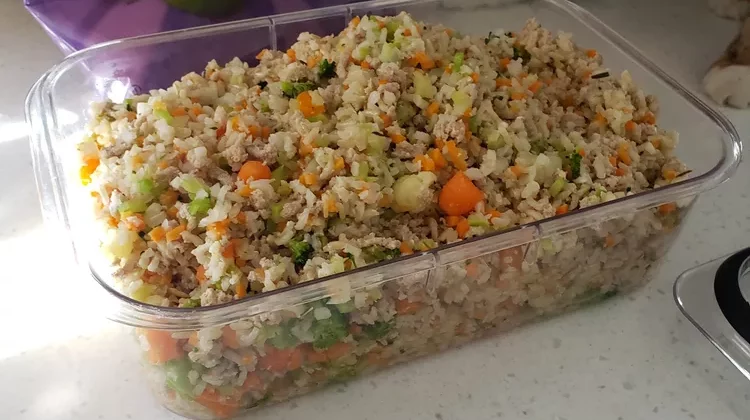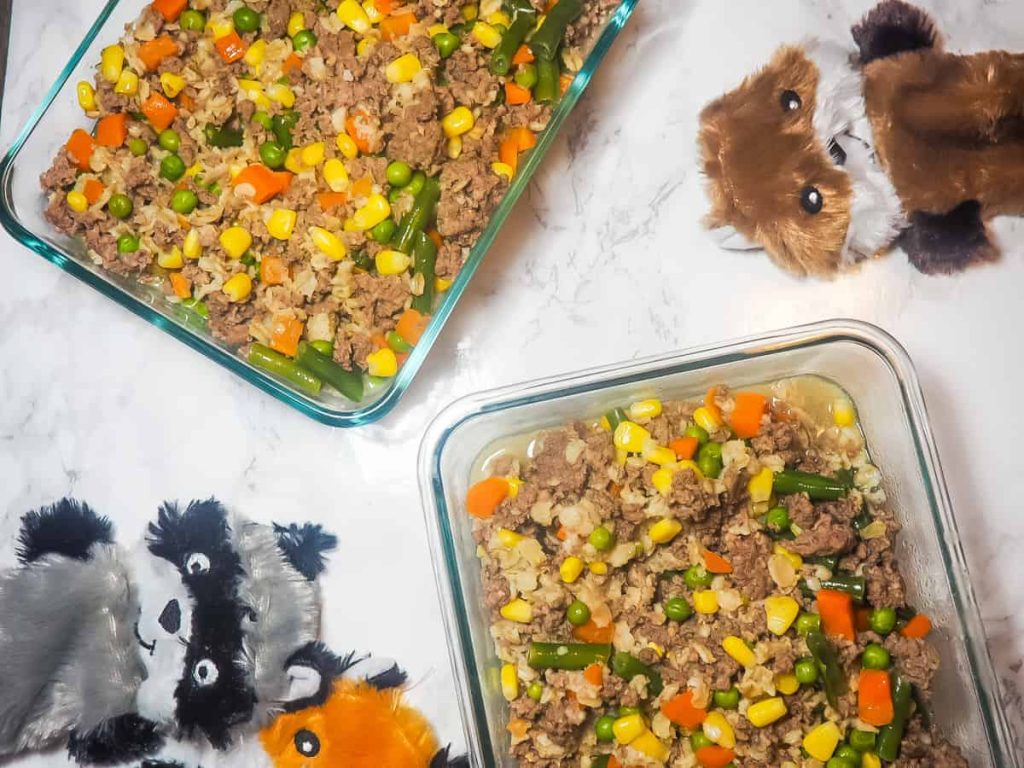
Discover the joy of nourishing your canine companion with homemade dog food, crafted with love and care in your own kitchen. Say goodbye to mysterious ingredients and hello to wholesome goodness as you go through the journey of cooking delight for your puppies.
From tasty meats to nutritious veggies, create a flavorful and healthy meal for your beloved dog.
Creating homemade dog food using ground turkey, rice, and vegetables is a simple process. I’ve been preparing my own dog food for four years now, starting when my dogs were puppies. This nutritious blend can be seamlessly incorporated into their regular kibble, much to their delight.
Let’s get started
- Prep Time: 5 mins
- Cook Time: 25 mins
- Total Time: 30 mins
- Servings: 5
- Yield: 10 cups
What are the best ingredients to put in homemade dog food?
- 1 pound ground turkey
- 6 cups water
- 2 cups brown rice
- 1 teaspoon dried rosemary
- ½ (16 ounce) package frozen broccoli, carrots and cauliflower combination

Cooking direction
- In a large Dutch oven, combine ground turkey, water, rice, and rosemary. Stir until the ground turkey is broken up and evenly mixed into the mixture. Bring it to a boil over high heat, then reduce the heat to low and simmer for 20 minutes.
- After 20 minutes, add the frozen vegetables and continue to cook for an additional 5 minutes. Remove the Dutch oven from the heat and allow the mixture to cool. Once cooled, refrigerate it until ready to use.
Nutrition FactsServings Per Recipe 5, Calories 440%, Daily Value *Total Fat 10g13%Saturated Fat 3g13% Cholesterol 72mg24%Sodium 118mg5%Total Carbohydrate 64g23%Dietary Fiber 5g16%Protein 23g46%Potassium 516mg11%
Frequnetly Asked Questions (FAQ)
Homemade dog food can be nutritionally balanced if formulated properly. It’s essential to include a variety of ingredients such as proteins, carbohydrates, healthy fats, vitamins, and minerals. Consulting a veterinarian or canine nutritionist can help ensure your recipe meets your dog’s dietary needs.
Essential ingredients for homemade dog food include a quality protein source (like turkey or chicken), carbohydrates (such as rice or sweet potatoes), healthy fats (like olive oil or fish oil), and a variety of vegetables for vitamins and minerals.
To ensure your dog receives all necessary nutrients, it’s crucial to rotate ingredients, vary protein sources, and incorporate supplements if needed. Consulting with a veterinarian or canine nutritionist for guidance tailored to your dog’s specific needs is recommended.
Raw ingredients can be used in homemade dog food, but it’s important to handle them safely to avoid foodborne illness for both you and your pet. Cooking ingredients thoroughly or using pre-cooked options can mitigate this risk.
Transitioning your dog from commercial kibble to homemade food should be done gradually over 7-10 days to avoid digestive upset. Start by mixing a small amount of homemade food with your dog’s regular kibble, gradually increasing the ratio of homemade food each day until the transition is complete.
Are there any common allergens I should avoid in homemade dog food?
- Common allergens in dog food include grains (such as wheat, corn, and soy), dairy, and certain proteins (like beef or chicken). If your dog has known allergies or sensitivities, it’s essential to avoid these ingredients and choose alternatives that suit your pet’s dietary needs.
Can homemade dog food be frozen for later use?
- Yes, homemade dog food can be frozen for later use. Portioning the food into meal-sized servings and storing them in airtight containers or freezer bags can help maintain freshness. Thaw frozen portions in the refrigerator before serving.
How can I tell if my dog’s homemade diet is working for them?
- Monitoring your dog’s overall health, energy levels, coat condition, and digestive health can help determine if their homemade diet is suitable. Regular check-ups with a veterinarian can also provide insights into your dog’s well-being and help adjust the diet as needed.
Can I feed my dog chicken and rice everyday?
Feeding your dog chicken and rice every day may not provide adequate nutrition. Variety is essential for a balanced diet. Consult a veterinarian to ensure your dog’s nutritional needs are met appropriately.
What should top 3 ingredients be dog food?
The top three ingredients in dog food should ideally be quality sources of protein, such as chicken, turkey, or beef, followed by whole grains like brown rice or oats, and a variety of nutrient-rich vegetables.
